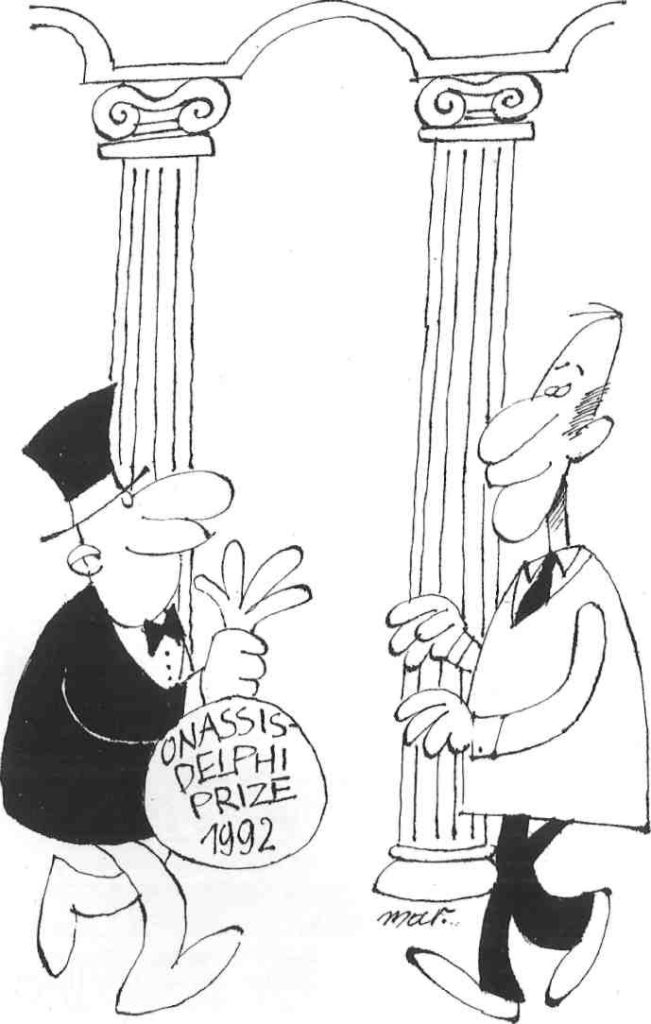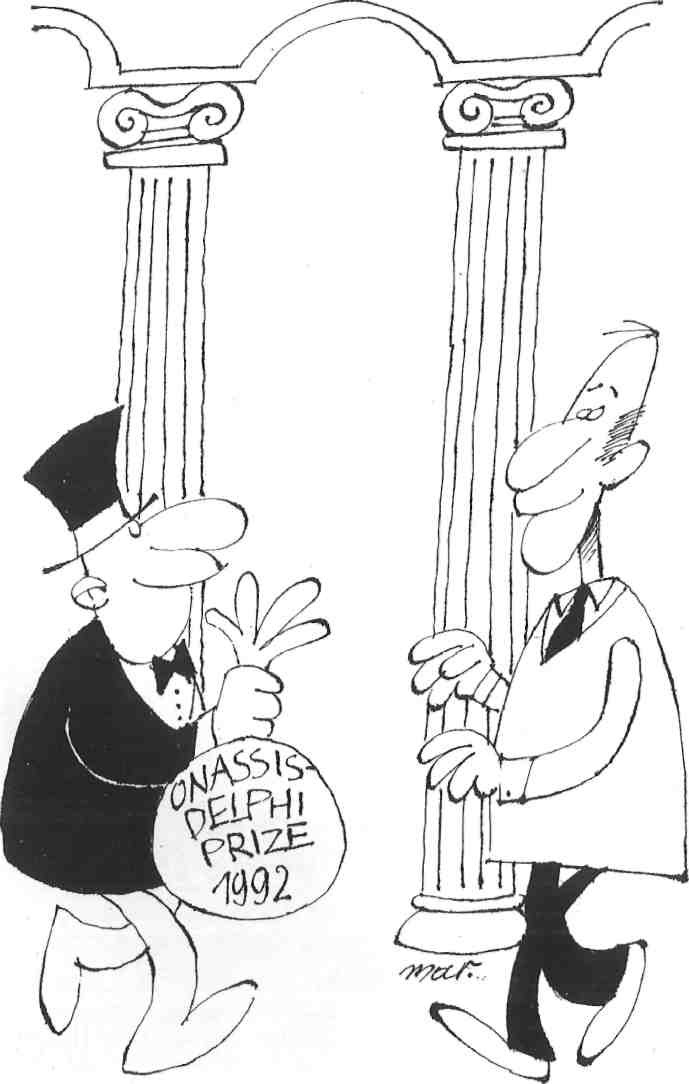“What comfort to this great decay may come shall be applied.” So Shakespeare in King Lear. Add: It will act as a relief to the plague bestowed upon modern Man as a token for his illusory triumph over Nature.

Ever since Francis Bacon, the natural environment has been considered as an exterior object to exploit ad infinitum, Man being superior to all else and equal only to God. Although this might sound peculiar, it has not ceased to be the dominating belief in our day and age. We are in a mess as far as our life is concerned, but despite the decay, many keep on singing the same tune.
The Norwegian Prime Minister, Gro Harlem Brundtland was awarded the Onassis Delphi Prize 1992 for Man and the Environment. A surprising and hearty mensuration should one judge from the state of affairs of that Arctic country.
The Onassis Awards Committee was surely not aware of the fact that Norwegian salmon is fed antibiotics, hormones and synthetic microorganisms which makes this sad, neofish unfit for human consumption. The North Sea bed is sinking under the plundering of its entrails. Cod and herring once abundant are now a rare catch. Norsk Hydro (a chemical works) sees to it that nothing keeps alive in that Arctic country’s southern fjords. The snow on top of the mountains is black from soot. Norwegian lakes are dead as a dodo, and the Norwegian Electricity Authority has constructed dams over practically all rivers and blocked all valleys depriving the nomadic Laplanders from their traditional grazing land and livelihood.
But the Norwegian Prime Minister has sponsored a UN Report on Man and the Environment in which all the environmental decay comes out in full. That is most probably the reason for the Delphi distinction.
According to the Brundtland Re-port, “Humanity has the ability to make developments sustainable… The concept of sustainable development does imply limits… (!) – not absolute limits but limitations imposed by the present state of technology and social organization on environmental re-sources and by the ability of the bios-phere to absorb the effects of human activities…”
The Report writers see the possibility of a new era of economic growth, one that must be based on policies that sustain and expand the environmental resource base.
“And we believe such growth to be absolutely essential to relieve the great poverty that is deepening in much of the developing world.”
Indeed, never before has anyone relied on Lutheran faith in technologic-al development to support ecological limits on the supply of natural resources and to attribute the deterious effects of refuse and wastes on capital-ist production. According to the Brundtland Report, politicians ought to have the will to do the Right Thing and be Good and Respectful Managers of the world’s natural resources! If the key to the Report’s notion that development sans surcease can combine with less environmental destruction through the adoption of “environmental management thinking,” then the flaw is surely the fact that the Report worries little about the social origine of ecological degradation.
The Brundtland environmental management ‘thinking’ consists of two aspects: 1) increasing (somehow) the capacity of the biosphere to produce (all’s cheerful!) renewable resources, and, 2) reducing the overex-ploitation and subsequent destruction of this same process.
Technological innovation thus can increase the maximum sustainable yield of renewable resources, interpreted as how one can get more with less on an expanding basis: certainly a fallacy. The rapacious quantitative drive is enforced over the qualitative pursuit, leaving politicians and businesspeople in charge of the Good on earth. The biosphere proves every day that accumulation of riches is neither necessary nor inevitable. It is sad to see that the Brundtland Report is not aware of the fact that the economic world of senseless accumulation and development has reached its limits whereby chemical pollutants and nuclear waste are practi-cally non-recyclable and cannot easily be absorbed by the biosphere.
It therefore seems that the Brundt-land Report gives a sprat to catch a herring. Politicians have on a global basis taken upon themselves to be the Saviours of Heaven (or Nature if you wish) on Earth as long as you vote for them. Ecological recuperation is a new political strategy since it may attract new voters. The great image of prog-ressive politicians in Greece expressed themselves so. Until recently they held government positions and even used Carl Orff s music as their war marches, ignorant of the erotic content of the verses, due to language barriers.
These and other third world intel-lectuals have just discovered Waste Recycling as a political slogan. The person in charge of the “Waste Recycling Program of Attica” explains that “large cities are artificial urban ecosystems” where refuse recycling is a sort of “liberating solution of waste management.” The man willingly supports Mayor Logothetis of Piraeus who is still unable to get the necessary votes to get his recycling project through the local government for, according to some, the company willing to invest has to swear allegiance to the historic fact that Macedonia is indeed Greek…
Don’t believe the jig is up. Ecologists as well take an active role in this whirlpool of nonsense. Examples abound: It is not uncommon to attend meetings of local ecologists and not be choked by cigarette smoke. Or even to hear an ecologist complain about the super markets’ extensive use of plastic while blowing smoke in your face. The local Greens, represented in Parliament, bicker about who is going to spend subsidies granted by the Greek state and the European Community. An ecologist businessman may use his BMW in order to go to his office three hundred meters away but he still spon-sors an ecological magazine printed on acid paper. Another ecologist activist tries humbly to explain that he prefers to use his car in downtown Athens to riding a bike as smoking has caused him breathing difficulties. The director of Greenpeace in Greece is against DEH as this prevents the development of solar and wind energy on a polyka-toikia basis.
These ideologists do not seem to be aware of the fact that recycling, for one, does not liberate but mainly displays the course of a capitalist society that is rationalizing further its con-sumption of merchandise. It is true though that rubbish is the main course of the political organization in question. More refuse could not usurp its body. If politicians master the art of making vile things precious, ecologists tend to point their fingers all too often at others when they should start with cleaning themselves, changing their everyday life as a first step. The art of their necessities is strange for one side mocks another.
Murray Bookchin once wrote that “Civilization as we know it today is more mute than the nature for which it professes to speak and more blind than the elemental forces it professes to control.” The Brundtland Report has nothing to offer but more accumulative development and Good Environmental Management Thinking. The only positive idea that emerges from this Report is that the environmental impasse is too great to be avoided. Nature itself is now talking to Man and actually putting him in place. Colorful decision makers however do not seem to see that the way of everyday life has to change.
On the other hand, ecologists are slowly being absorbed into what they formally but not essentially refuse: the spectacular power structure of the Modern State. The Greens in Germany, the most socially and environmentally polluted country in Europe, are disintegrating victims of unfortunate circumstances. The German Green Movement is abruptly coming to an end, spectacularly displayed in the suicide of two lonely people who could not face the recuperative power of modern capitalism.
Politicians and their concourse are a sad spectacle of intellectual baseness and financial roguishness. Businesspeople are victims of small-minded marketing ideology and accumulative folly. Whereas ecologists deify the Environment and forget their personal and social relations through their comportment to others, including Nature.
If something is to be done, it should start with the catharsis of the self and go through the process of changing one’s everyday life. All else will follow. This, it is true, is more difficult than anything. It should be reminded that the flames of Ragnarok purified the world of the Norsemen. This is surely as painful as liberation can be. And it is possible. Actilabores iucundi.








